November 18, 2024 | 11:26 GMT +7
November 18, 2024 | 11:26 GMT +7
Hotline: 0913.378.918
November 18, 2024 | 11:26 GMT +7
Hotline: 0913.378.918
Massive piles of plastic waste dominate the scenery in Xa Cau hamlet (Quang Phu Cau commune, Ung Hoa district, Hanoi). These heaps are visible along Highway 21B and scattered everywhere, piled high along roads, in front of homes, at markets, and even in fields and cemeteries.
Mr. Nguyen Kha Huy, a local trader specializing in plastic waste sorting, shared, "I’ve lived with plastic since I was a child, and even now, it’s all around me.” Huy and his generation, raised amidst plastic waste, are still struggling to escape poverty and make a living in Xa Cau’s sprawling scrapyards.
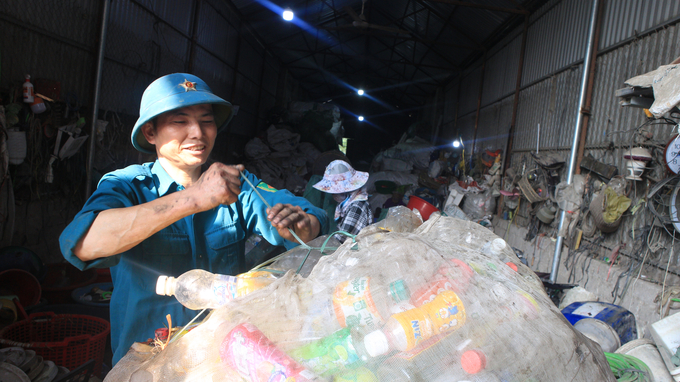
Mr. Huy has lived with plastic and make a living by selling plastic. Photo: Minh Toan.
For nearly half a lifetime, plastic has been an integral part of life in Xa Cau. While some grew up in this environment, others have succumbed to the consequences of living with plastic.
Plastic recycling involves several stages, including collection, sorting, washing, and shredding. Collection begins at 6 a.m. and ends by noon. Men typically handle this physically demanding work, loading and transporting materials. Wealthier families use trucks, while less fortunate households rely on pushcarts.
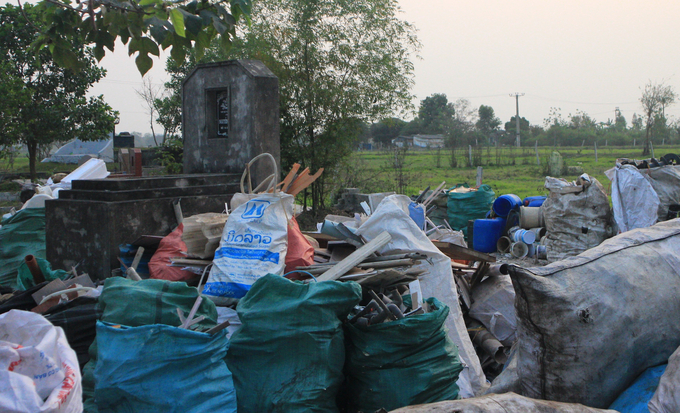
Plastic waste is ubiquitous in Xa Cau, with no corner untouched. Photo: Minh Toan.
Nearly every household is involved in sorting plastic waste, a task requiring diligence but not advanced skills. From the elderly to children, and even those with illnesses, everyone can participate. Only those completely unable to work are left out.
Plastics are sorted into various categories, such as clear and flexible plastic. Usable old buckets are repaired and sold, while broken ones are shredded and cleaned. Plastic bottles have their labels removed and are sorted before being cut into smaller pieces or sold.
Wages for sorting plastic are minimal. Mrs. Nguyen Thi Uoc, 47 years old, remarked, “Sorting plastic is the easiest job because even the sick, elderly, or children can do it.”
Similarly, Mrs. Nguyen Thi Vui, 67 years old, said, “It’s just VND 1,000 per kilogram after removing the labels and sorting. I’m not doing it for the money, it’s just to get a few vegetables. If I stay home, I feel restless.” Vui can manage to sort only 20 kilograms daily, earning around VND 20,000. Her age and health problems, including joint issues, prevent her from working for long hours.
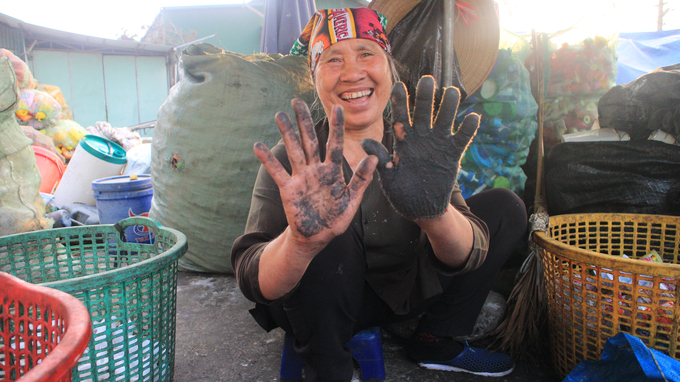
Despite the meager income, she feels fortunate to still be able to work and not depend on her children. Photo: Minh Toan.
N.T.M., 54 years old, earns a similar wage but struggles with chronic illnesses requiring lifelong medication. “The money isn’t enough for my medicine, but if I don’t work, the expenses pile up even faster. I’ve had to borrow money for treatments and work to repay it,” she explained.
When asked why she doesn’t switch to a better-paying job, she responded, “With back pain, I can’t farm or do anything else. Sorting plastic is simple, just removing labels and organizing. It’s not that I don’t want to change jobs.”
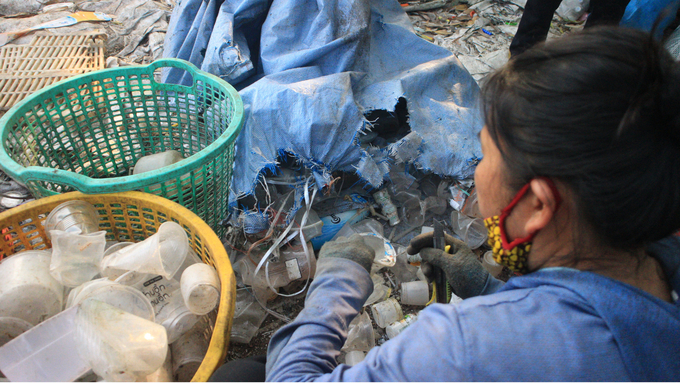
Mrs.M struggles with plastic products everyday. Photo: Minh Toan.
After sorting, the plastic is sold to households that specialize in shredding or further processing. Some families press the sorted plastic into bricks for sale, though this requires significant investment and expertise, limiting the number of households involved.
Quang Phu Cau commune once had six hamlets, five of which were known for making incense sticks. Xa Cau, in particular, was famous for its distinctive black incense. However, the rise of plastic waste processing gradually overshadowed this traditional craft, leading to its decline.
Explaining this shift, Mrs. Nguyen Thi Nhung, 65 years old, one of the first to engage in plastic waste processing, said, “Initially, only a few people started, but then the entire village followed.” Over time, this activity transformed the village into Hanoi's largest scrap hub, eclipsing its historic role as a center of incense production.
Today, plastic waste is the primary source of livelihood for most of Xa Cau’s residents. They’ve grown up with it, and their income depends on it. Without plastic waste, life in this village would be entirely different.
Translated by Kieu Chi
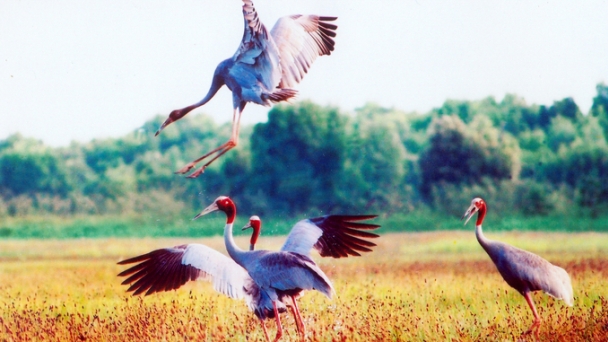
(VAN) People in Dong Thap province view red-crowned cranes protection as a personal responsibility and collectively call on the community to make efforts in this mission.
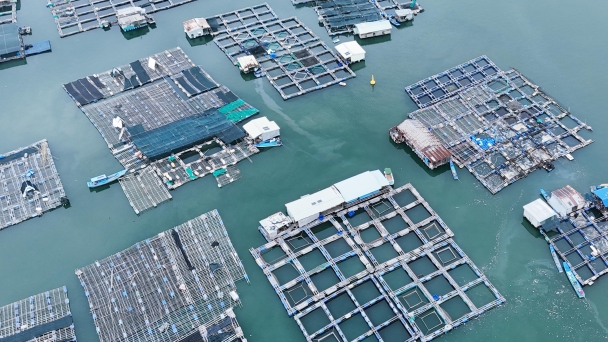
(VAN) Ba Ria - Vung Tau Department of Agriculture and Rural Development directed relevant units to guide people and businesses on prevention and control of diseases in aquaculture.

(VAN) Fears of empty supermarket shelves and panic buying if farms withhold production.

(VAN) The Vietnam National University of Forestry facilitates the exchange of knowledge and connects experts in sustainable forest management, carbon benefits, and climate change mitigation.
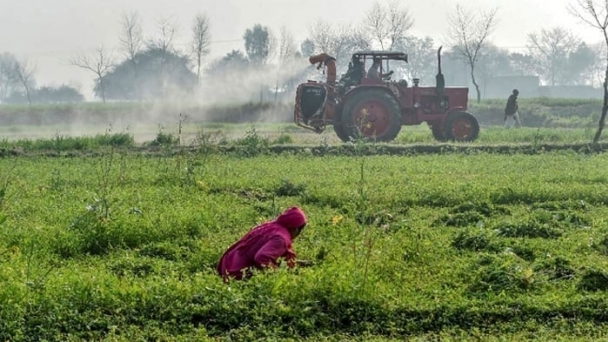
(VAN) Sources say provincial governments have kick-started movement towards legislation on Agriculture Income Tax.
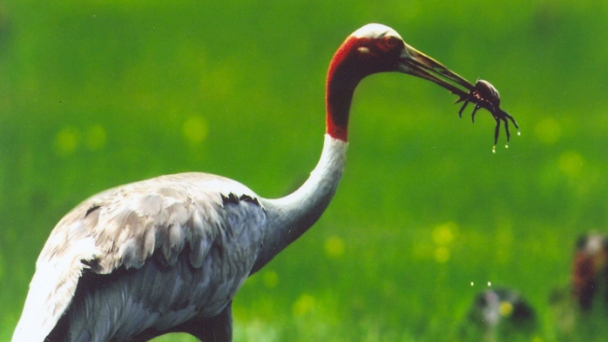
(VAN) The training class provides knowledge for trainers on communication work as well as policies and solutions in the work of recovering, protecting, and developing cranes.